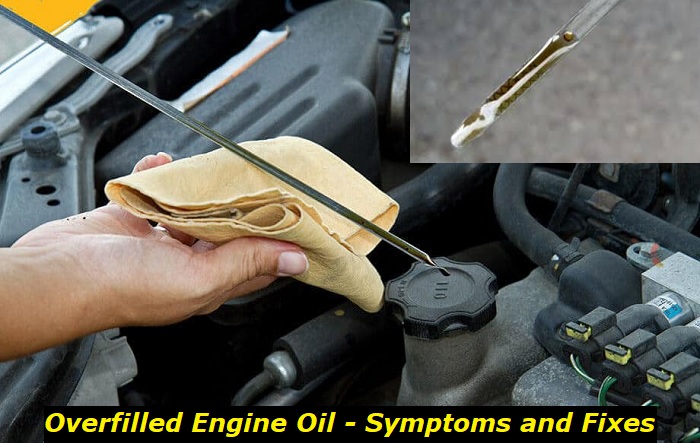Inside an internal combustion engine, there is oil. Oil is a fluid substance that flows through various parts of an engine. The fundamental job of motor oil is to grease up the motor parts, which are in consistent friction. This, hence, lessens contact which would in general increase the wear and tear of motor parts.
Oil level problems highlights
- Level of urgency:medium
- Average mileage:not related to mileage
- Repair cost:$5 - $550
- DIY repair:yesbutmaybe complicated
- Commonreasons:overfilled oil, coolant leaking into oil, gas leaking into oil
- If ignored:fatal engine damage, catalytic converter damage
- How to solve:add oil or pump it outdependingon the nature of the problem

What is overfilled engine oil?
Before you can figure out how to fix overfilled engine oil, you really want to initially get a profound comprehension of what overfilled oil is. When an excessive amount of oil is added to the engine, the level in the oil pan turns out to be excessively high.
That permits a quick lobed bar called the crankshaft to come into contact with the oil and basically circulate air through it. The outcome is a frothy, foamy substance that cannot grease up the engine hence the name overfilled engine oil.
Noise caused by overfilled engine oil
An overfilled engine of oil brings about remarkable engine sounds which include ticking, tapping, and knocking sounds. The excess engine oil can make air pockets in the oil. This causes the oil to froth and decreases its viability in greasing up engine parts. As a result, the engine conveys shaking and clicking sounds that cause aggravation during driving.
Symptoms of overfilled engine oil
The simplest method for recognizing overfilled engine oil is by analyzing its symptoms. The sooner you can recognize these symptoms and detect the issue, the lesser harm you endure.
1) Oil leakage from the vehicle
One issue that can rise out of overfilling your engine oil is the potential for oil spills. The overflow oil can descend on the gaskets and seals of the engine, forcing them to crack. Even worse, they could break and bring about oil leakage throughout the entire engine compartment.
These oil spills can prompt significant harm to your vehicle's engine. Amassed oil can degrade the rubber elastic hoses and seals utilized in these parts and prompt them to break down rashly.
Driving a vehicle with an oil leak can be hazardous for yourself and other drivers. Oil can become combustible when it arrives at a specific temperature and portions of your vehicle's engine can get extremely hot, which might bring about a fire.
2) The smell of burning engine oil
Another symptom of an overfilled oil a vehicle can have is the burning of oil in the engine. For there to be accumulated oil in the engine of a vehicle, there has to be a leak somewhere. The oil that is spilling can dribble out to warming parts of the engine and produce a bitter consuming smell.
At times the vehicle may smell like burning oil but still fail to overheat. There are two reasons behind this: either oil leakage or low oil level by the engine.
3) Smoke from the engine compartment
On the off chance that your vehicle is packed with engine oil the next may happen: thick white smoke. Let's say you drive your vehicle and see a lot of thick, white fumes and smoke from the engine compartment. This should tell you that there's overfilled oil in your engine.
In this case, the engine oil could most likely be burning inside the engine block. Needless to say, is that it could be fluids such as antifreeze likewise to be the guilty party. In other scenarios, overfilled engine oil may cause blue smoke from your engine compartment.
This can happen when the crankcase is over-compressed because of the sump being packed with engine oil. The extra oil will be constrained up the cylinder wall and into the ignition chamber.
4) Black exhaust from the tailpipe
In the case where your vehicle piston rings happen to get damaged, more engine oil will find its way into the burning chamber. Oil is then obliterated by consumption or decay brought about by openness to the extreme intensity of fuel ignition in the chambers or the metallic pieces of the burning chamber. Extreme burning of oil will cause heavy dark smoke clouds to rise out of your exhaust pipe.
5) Unusual noises from the vehicle engine
Earlier on, I mentioned that an overfilled engine of oil generates out-of-the-ordinary sounds. These unfamiliar sounds include knocking, ticking, and tapping sounds. The logic of how these sounds are created is simple.
Excess oil in the engine leads to the creation of air pockets in the oil. Consequently, the oil is forced to foam. This reduces the effectiveness of oil in lubricating engine components. Though the strange noises produced could be a result of overfilled engine oil, it could still be due to a damaged muffler.
How to fix overfilled engine oil
The quick fix to overfilled engine oil wholly depends upon the cause of this issue. Begin by distinguishing the reason behind it. Here are a few normal and simple fixes you can apply when this occurs to you.
1) Drive or tow your vehicle to a technician for a new oil change
Assuming you know how to change your own oil and feel open to making it happen, you can feel free to do that at home. However, remember that your vehicle likely should be viewed by an expert as quickly as time permits to affirm there's no engine damage.
2) Raise the vehicle and channel excess oil physically assuming you're capable
You'll have to feel comfortable around a vehicle and have legitimate devices close by for this. Park on a level surface and draw in the stopping break. Lift your vehicle with the jack and make sure that the jack upholds are steady.
Then, slide under the vehicle and spot an oil dish under the oil sump. Relax the sump with an attachment and let a portion of the oil channel out into the dish. Plug the sump back up and utilize the dipstick to check the oil level. Assuming the dipstick shows that your oil is as yet overfilled, repeat the cycle.
3) Eliminate the excess oil with an oil extractor pump in the event that you have one
Eliminate the dipstick and fit the pump into a power source. Then, at that point, plunge the extraction tube into the dipstick opening and put the oil pan under. Turn on the pump to extract the oil, watching out for how much oil is being eliminated.
Pause and check the oil level occasionally with the dipstick until you're within the right range. On the off chance that you have no particular devices or experience doing this, I don't suggest attempting it.
Tip: you can use medical syringe with a flexible tube attached to it for pumping out some oil from the engine.
Conclusion
Overfilled engine oil is a serious issue. An issue with pressing consideration which if not fixed, could create a hazardous situation on the road. It could altogether diminish productivity as well as the performance of an engine. Far more atrocious, it could wind up making irreparable damage to the engine.
Every vehicle owner has an obligation to detect whenever engine oil overfills in the engine compartment. Additionally, you ought to know the unusual sounds that generate as a result of overfilled engine oil. Luckily, these rattling and clicking sounds are loud enough to be heard as they cause disturbance in the engine compartment.
Furthermore, a vehicle owner should be in a position to note symptoms that accrue with overfilled engine oil. Common symptoms that I mentioned earlier on such as black smoke exhaust from the tail pipe, the smell of burning engine oil, and oil spills from your vehicle just to mention but a few.
Loaded with such data, a vehicle owner could undoubtedly go to proactive lengths to appropriately resolve the issue of overfilled engine oil once it happens. In the long run, a vehicle owner can save a great deal from costs on the damage that might have occurred thereafter.
About the authors
The CarAraC research team is composed of seasoned auto mechanics and automotive industry professionals, including individuals with advanced degrees and certifications in their field. Our team members boast prestigious credentials, reflecting their extensive knowledge and skills. These qualifications include: IMI: Institute of the Motor Industry, ASE-Certified Master Automobile Technicians; Coventry University, Graduate of MA in Automotive Journalism; Politecnico di Torino, Italy, MS Automotive Engineering; Ss. Cyril and Methodius University in Skopje, Mechanical University in Skopje; TOC Automotive College; DHA Suffa University, Department of Mechanical Engineering






Add comment